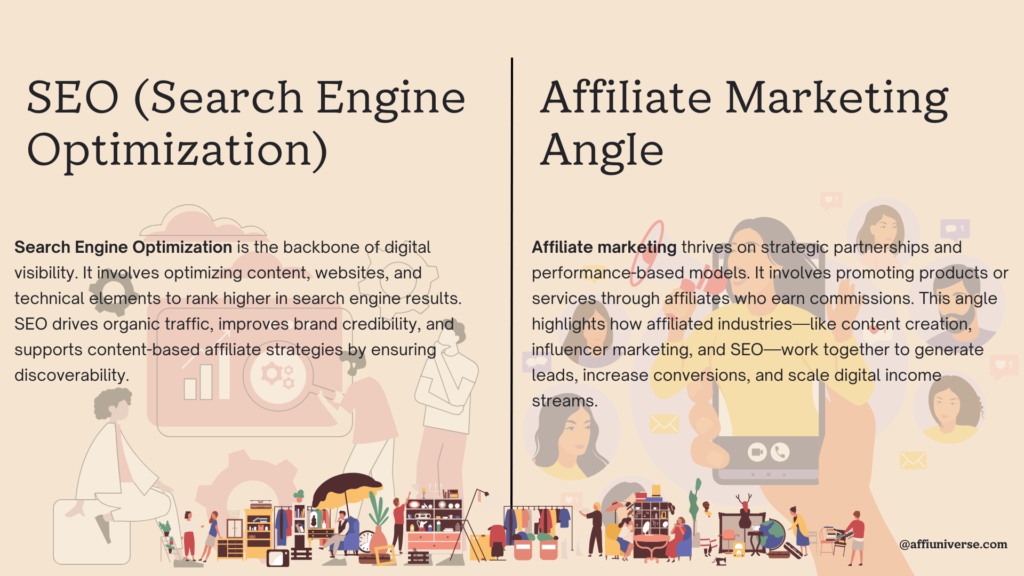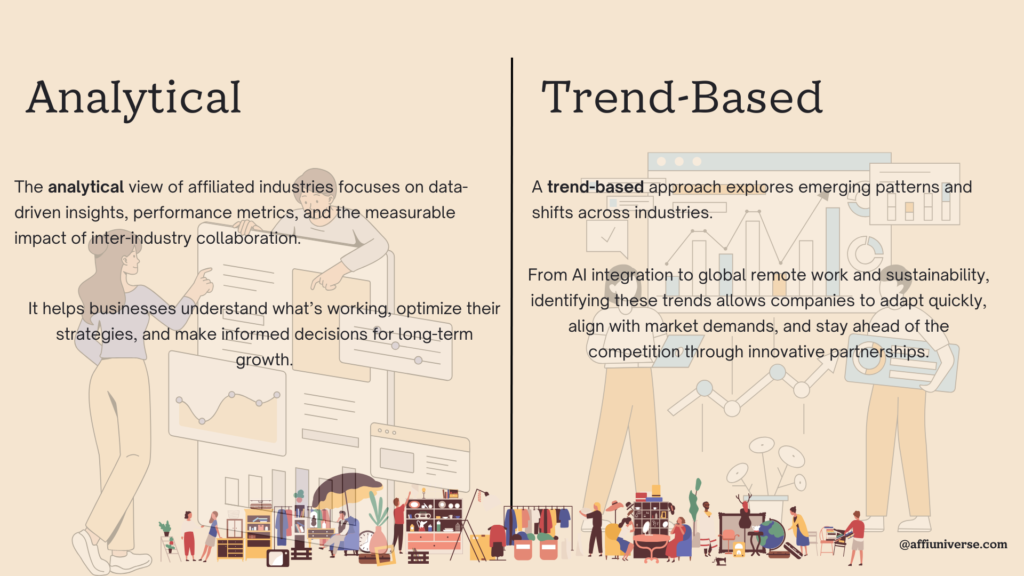Affiliated Industries – In a rapidly evolving global economy, the concept of affiliated industries plays a critical role in shaping business dynamics. These are industries that are interconnected, either through partnerships, supply chains, shared technologies, or customer bases. Understanding these relationships is essential for businesses looking to innovate, grow, and stay competitive.
Affiliated industries often work in synergy. For example, the smartphone industry is affiliated with telecommunications, software development, semiconductor manufacturing, and digital marketing. Each sector relies on the other to deliver a complete consumer experience.
This guide will explore what affiliated industries are, why they matter, and how they contribute to modern economic ecosystems.
What Are Affiliated Industries and Why Do They Matter?
Affiliated industries refer to sectors that are related through shared interests, complementary functions, or economic dependencies. These affiliations can be formal (like partnerships or joint ventures) or informal (like trends that influence multiple sectors simultaneously).
Why They Matter:
- Economic Synergy: Affiliated industries often support each other’s growth. For instance, growth in the automotive industry can drive demand for steel, rubber, and electronics.
- Innovation Acceleration: Collaboration across industries fosters innovation. A good example is how tech companies partner with healthcare providers to build telemedicine solutions.
- Market Expansion: Companies tapping into affiliated industries can diversify offerings and reach new markets.
- Supply Chain Efficiency: Interconnected industries often streamline processes, reduce costs, and improve customer satisfaction.
Businesses that recognize and engage with their affiliated industries tend to be more resilient and adaptable in the face of change.
Exploring the Role of Affiliated Industries in Today’s Economy
In today’s interconnected world, no industry operates in isolation. Affiliated industries form the backbone of many global supply chains and digital ecosystems.
Real-World Examples:
- E-commerce & Logistics: The boom in online shopping has fueled growth in courier services, packaging, and digital payment systems.
- Renewable Energy & Construction: As green energy becomes mainstream, construction companies collaborate with solar panel manufacturers and energy management software firms.
- Entertainment & Technology: Streaming platforms rely on cloud computing, content creators, digital rights management, and device manufacturers.
The role of affiliated industries is becoming even more vital with the rise of emerging technologies like AI, IoT, and blockchain, which cut across multiple sectors simultaneously.
SEO (Search Engine Optimization) / Affiliate Marketing Angle

In the digital era, affiliate marketing has emerged as one of the most popular and cost-effective ways for businesses to expand their reach and drive sales. Affiliate marketing relies heavily on affiliated industries, such as SEO, content creation, influencer marketing, web development, and e-commerce platforms.
These interconnected industries form an ecosystem where one industry fuels the growth of another. For instance, SEO experts optimize websites that host affiliate content, while marketing automation tools track performance and improve ROI. This synergy ensures that affiliate marketing campaigns are not just effective, but also scalable and sustainable.
As businesses seek more organic and performance-based growth models, understanding the role of affiliated industries in the affiliate marketing landscape becomes essential.
Affiliated Industries in the Age of Affiliate Marketing
Affiliate marketing has evolved into a powerful revenue model where businesses reward partners for driving traffic or sales. In this digital era, affiliated industries—such as content creation, influencer marketing, e-commerce, and data analytics—play a vital role in fueling affiliate success.
These industries are tightly interconnected. For example, content writers and SEO specialists work with affiliate networks and e-commerce platforms to promote products. Meanwhile, tracking tools, ad networks, and marketing automation platforms ensure that performance is optimized.
The effectiveness of affiliate marketing heavily depends on this ecosystem of affiliated industries working together in harmony.
Linking Success: How Affiliated Industries Benefit Online Entrepreneurs
For digital entrepreneurs, affiliated industries represent a goldmine of opportunity. Here’s how:
- Access to Tools: Entrepreneurs benefit from SaaS platforms, SEO tools, and analytics solutions developed by affiliated industries.
- Streamlined Monetization: Platforms like Amazon Associates, ClickBank, or ShareASale connect content creators with sellers across various industries.
- Content Synergy: A blogger writing about fitness can monetize their content by partnering with supplement brands, gym equipment providers, or wellness apps, each representing an affiliated industry.
- Reduced Entry Barriers: Entrepreneurs don’t have to build products from scratch—they can tap into affiliate networks and focus on marketing and audience building.
Success in affiliate marketing is about aligning your efforts with the right industries that support and amplify your value proposition.
The Affiliate Connection: How Related Industries Boost Each Other
Affiliated industries often drive one another’s growth. When one sector innovates, others evolve to stay relevant.
For instance:
- Growth in online learning (ed-tech) boosts demand for digital tools, video platforms, and email marketing services.
- An increase in health awareness fuels markets for fitness equipment, apps, wearables, and supplement brands—all feeding into affiliate campaigns.
By recognizing and capitalizing on these industry linkages, businesses and individuals can maximize returns from their affiliate strategies.
Analytical / Trend-Based

In an ever-changing economic and technological landscape, analyzing trends across affiliated industries reveals key insights into market evolution and future opportunities. These trends often cut across multiple sectors, such as the rise of AI, blockchain, sustainability, or remote work, and create ripple effects that reshape entire business ecosystems.
Affiliated industries evolve in response to each other’s growth and innovations. For example, advancements in renewable energy influence the construction, tech, and finance industries. Similarly, shifts in consumer behavior, like a focus on wellness or digital convenience, impact food, retail, logistics, and app development.
By studying these cross-industry trends, businesses can position themselves strategically, anticipate market shifts, and identify profitable areas for investment or collaboration.
Top Trends Shaping Affiliated Industries in 2025
As we move deeper into 2025, several macro trends are transforming how affiliated industries operate:
- AI-Powered Collaboration: Industries like customer support, marketing, and e-commerce are increasingly integrating AI to automate tasks and enhance efficiency.
- Sustainability Partnerships: Companies are forming alliances across industries to meet ESG goals—linking energy, logistics, and retail sectors.
- Creator Economy Expansion: Content creators are now key players in multiple industries, driving growth in marketing tech, merchandising, and education platforms.
- Blockchain Integration: From finance to supply chain management, blockchain is aligning industries in new ways that prioritize transparency and security.
Staying informed about these trends helps businesses anticipate shifts and adapt proactively.
The Future of Affiliated Industries in a Globalized World
Globalization has expanded the reach of every industry, making affiliations more strategic than ever. Borders no longer restrict partnerships—tech developers in India collaborate with retailers in the U.S., manufacturers in China supply goods to global e-commerce giants, and influencers in Europe promote services across continents.
Key takeaways:
- Global Talent Pools are enabling cross-border innovation.
- Localized Marketing strategies are being supported by global affiliate networks.
- Digital Infrastructure continues to unite industries that were once isolated.
In this interconnected world, the success of one industry often depends on the agility and adaptability of its affiliated partners.
Cross-Industry Collaboration: The New Competitive Advantage
In today’s competitive landscape, companies that foster cross-industry collaboration have a significant edge. These partnerships lead to:
- Faster Product Development: By merging capabilities (e.g., tech + healthcare), businesses launch smarter solutions.
- Greater Customer Experience: Retailers teaming up with logistics and AI firms deliver more personalized, efficient service.
- Resilience: Diversification through affiliation spreads risk and increases adaptability in crises.
A clear example is how fintech companies collaborate with banks, regulatory bodies, cybersecurity firms, and digital identity platforms to create seamless, secure user experiences.
Looking forward, cross-industry collaboration isn’t just a smart move—it’s becoming essential for survival and scalability.





